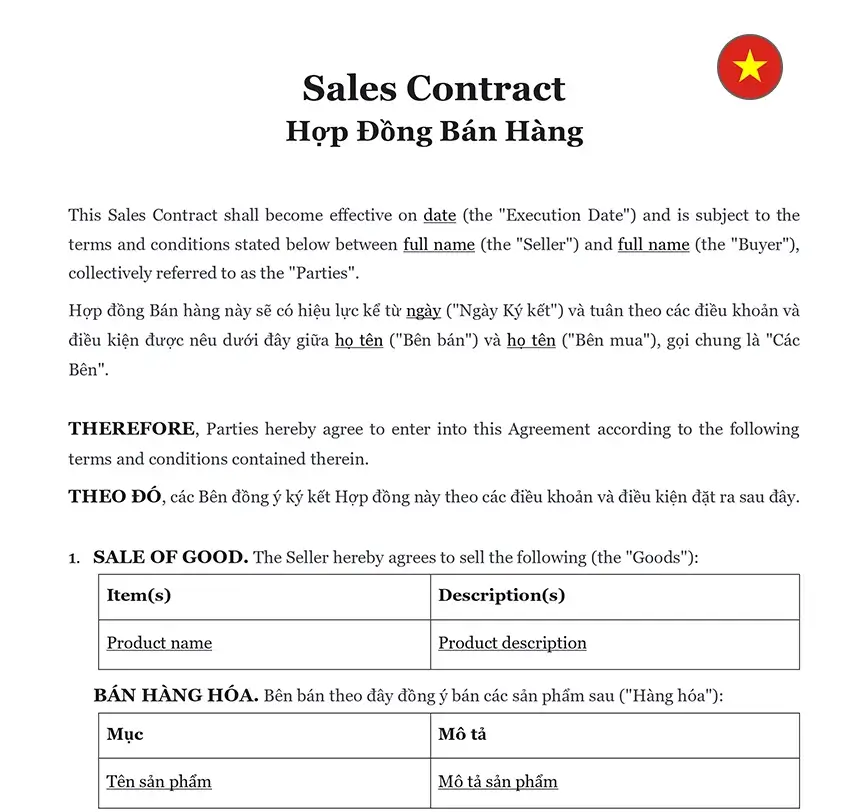Ready to use legal template
Drafted by experienced lawyers
Vietnamese-English translation
Ready to use legal template
Drafted by lawyers
Vietnamese-English translation
Home › Business contracts › Sales contract
Learn more about Sales Contract in Vietnam
A Sales Contract is a legally binding agreement between a buyer and a seller outlining the terms and conditions of a sale of goods or property. It clearly defines key elements such as the item being sold, price, payment terms, delivery timelines, and warranties or obligations of each party. In Vietnam, a well-drafted Sales Contract is essential to ensure compliance with local commercial laws and to protect both parties in case of disputes or misunderstandings. Sales Contracts are especially important for businesses operating across provinces or international borders, where detailed documentation is key. Download our Sales Contract, easy to edit in Word format and professionally drafted in both English and Vietnamese to suit legal and business needs in Vietnam.
Table of contents
What is a Sales Contract?
What should be included in a Sales Contract?
Why is a Sales Contract important in Vietnam?
What are the consequences of not having a written Sales Contract?
What are the differences between an exclusive and non-exclusive Sales Contract?
How should intellectual property rights be addressed in a Sales Contract?
What happens if there is a breach of a Sales Contract in Vietnam?
Can a Sales Contract be terminated in Vietnam?
Can a Sales Contract be modified after it has been signed?
What is a Sales Contract?
A Sales Contract is a legally binding agreement between a seller and a buyer that meticulously outlines the terms and conditions of a transaction involving the sale of goods or services. This essential document typically encompasses detailed information about the parties involved, a comprehensive description of the goods or services being sold, the agreed-upon price, and the payment terms. Additionally, it specifies delivery terms, warranties, and any other pertinent terms and conditions that may apply to the transaction. The primary purpose of a Sales Contract is to clearly delineate the rights and obligations of both parties, thereby providing a framework that helps prevent misunderstandings and disputes. By establishing mutual expectations and responsibilities, a well-crafted Sales Contract ensures a smooth and transparent transaction process, fostering trust and confidence between the seller and the buyer.
What should be included in a Sales Contract?
A Sales Contract should include several key elements to ensure that the agreement is clear, comprehensive, and legally enforceable. Here are some important components that are typically included:
1. Parties Involved
The full names and addresses of the seller and buyer should be clearly stated at the beginning of the contract.
2. Description of Goods or Services
A detailed description of the goods or services being sold, including any relevant specifications, quantities, or quality standards.
3. Price
The total price of the goods or services, including any applicable taxes, fees, or shipping costs.
4. Payment Terms
The payment terms, including the amount due, the due date, and any applicable payment methods or installment plans.
5. Delivery Terms
The terms and conditions for the delivery of the goods or performance of the services, including the delivery date, shipping method, and any delivery charges or responsibilities.
6. Warranties
Any warranties or guarantees provided by the seller regarding the goods or services, including the duration and scope of the warranty.
7. Intellectual Property Rights
Any provisions regarding the ownership or licensing of intellectual property rights related to the goods or services.
8. Dispute Resolution
Procedures for resolving disputes that may arise under the contract, including any requirements for mediation, arbitration, or litigation.
9. Termination Clause
Conditions under which either party may terminate the contract, including any notice requirements or penalties for early termination.
Why is a Sales Contract important in Vietnam?
A Sales Contract is important in Vietnam for several reasons:
| ➤ Legal Protection: A Sales Contract provides legal protection for both the seller and the buyer by outlining the terms and conditions of the transaction. It helps to prevent misunderstandings and disputes by clearly defining each party's rights and obligations. |
| ➤ Enforceability: A Sales Contract is a legally binding agreement that can be enforced in court if necessary. It provides a legal basis for seeking remedies in the event of a breach of contract. |
| ➤ Clarity and Certainty: By specifying the details of the sale, including the price, payment terms, and delivery terms, a Sales Contract provides clarity and certainty for both parties. This can help to avoid confusion and ensure that the transaction proceeds smoothly. |
| ➤ Risk Management: A Sales Contract can help to manage risks associated with the sale, such as issues with payment, delivery, or quality of goods or services. By including provisions for these potential risks, the contract can help to mitigate their impact. |
| ➤ Compliance: In Vietnam, certain types of sales, especially those involving high-value transactions or specific types of goods, may be subject to legal requirements or regulations. A Sales Contract can help to ensure compliance with these requirements. |




